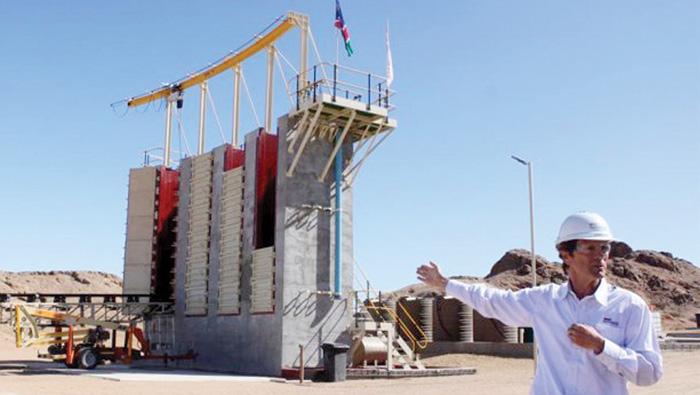
Lithium and rare earths essential for achieving green and clean energy objectives – Geingob

A two-day EU-Namibia Business Forum jointly organised by the Namibia Investment Promotion and Development Board and the European Union in Brussels, Belgium, officially kicked off on Tuesday with an opening statement by the President, HE Dr Hage Geingob.
The President emphasized that the EU collaboration aligns with Namibia’s National Development Plans, Vision 2030, Industrial Policy, Growth at Home Strategy, the SADC Protocol on Industry, and the Mineral Beneficiation Strategy for Namibia.
The head of state said the partnership, focused on making the world equitable and sustainable, seeks to deepen Namibia’s cooperation and broaden the government’s areas of mutual collaboration in constructing sustainable industrial clusters in their respective jurisdictions.
“In the pursuit of a greener and cleaner future, both Namibia and the EU share a deep and practical commitment to engender a just energy transition. Our government adopted Harambee Prosperity Plans I and II to accelerate the implementation and impact of the aforementioned plans and strategies. Securing access to these critical resources is not just an economic endeavour but a strategic security imperative for the world’s aspirations in delivering on green and clean energy objectives,” he said.
At the business forum, the President pointed out Namibia’s readiness to collaborate with the EU, which recognizes hydrogen as a critical component for decarbonizing sectors like heavy industry and transport to achieve carbon neutrality by 2050. “By 2030, according to the REPowerEU, the EU estimates that it will require 20 million tonnes of clean hydrogen and half of this has been earmarked for imports from trusted jurisdictions, such as Namibia,” he said.
Moreover, President Geingob said Namibia’s abundant resources, including lithium, cobalt, and rare earth elements, are crucial for securing a sustainable supply of these essential raw materials.
In the audience were representatives of Andrada Mining, which intends to mine 138 million tonnes of lithium and associated minerals, while Broadmind Mining has a maiden inferred resource of 570 million tonnes of light rare earths.
“These materials are essential for achieving our green and clean energy objectives and are in high demand across other industrial sectors, from aerospace to electronics and health.”
According to the International Energy Agency, getting to net zero by 2050 will require a six-fold increase in mineral input by 2040, and some metals, such as lithium, could see growth rates of over 40 times, with nickel and cobalt demand growing more than 20-fold.
Namibia’s economy relies heavily on mineral extraction and processing, contributing to GDP and foreign exchange earnings, the President pointed out. “However, we are no longer going to export raw minerals.” He noted that in conjunction with some of the European partners, Namibia plans to improve sustainability and develop local processing capacity, fostering sustainable growth, resource mobilization, and economic diversification.

Both the Investment Board’s Chief Executive, Nangula Uaandja, and Namibia’s Green Hydrogen Commissioner, James Mnyupe, made compelling presentations at the event. The event concludes on 25 October.
According to Uaandja, the renewable energy market is dynamic and replete with viable business cases. “Renewable energy plants are competitive and can be economically implemented without subsidies because of the cost-reflective electricity supplied by the grid. Namibia plans to contribute to regional cohesion by reducing the RSA’s emissions profile and alleviating Eskom and the SAPP of the strain of supplying power to its neighbours,” she said.
A panel discussion with representatives from several companies in the energy field also looked into the innovative collaboration between the EU and Namibia’s private sectors, pioneering a mutually beneficial partnership in Green Hydrogen.
Secretary General of the African Hydrogen Partnership, Siegfried Huegemann, moderated the panel discussion on ‘Private Sector: Paving the Way for a mutually beneficial GH2 Partnership.’ The panel discussed demonstrating the link between private-sector initiatives and the NGH2 Strategy.
Marco Raffinetti, Chief Executive of Hyphen; Ludovic Saverys, Chief Financial Officer of Compagnie Maritime Belge; Sven Thieme, Executive Chairman of Ohlthaver & List Group; Nicola Lecomte, Chief Executive of HDF Energy; Jerome Namaseb, Chief Executive of Daures Green Hydrogen Village; Alessandra Pasini, Co-Founder and President of Zhero and Jorgo Chatzimarkakis, Chief Executive of Hydrogen Europe, all participated in the discussion.












































